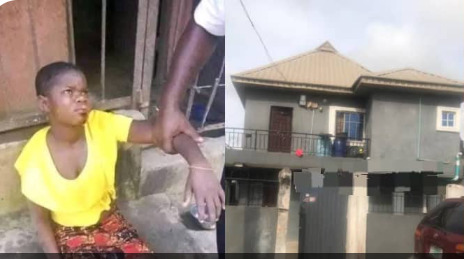
Outrage in Aba: Employer Allegedly Hurls House Help Off Two-Storey Building Over Dispute

In a deeply troubling incident that has sparked national outrage and ignited intense debate on social media, a woman in Aba, Abia State, allegedly threw her house help off the balcony of a two-storey building. The shocking act, which was said to be a punishment for an unspecified offence, has left many stunned and demanding immediate justice.
The report surfaced on Facebook through a viral post shared by a concerned Nigerian who claimed that the horrifying event occurred at a residential building located at 204 Niger, directly opposite Newday Fast Food in Aba. The post included a passionate plea for justice, stating that the victim, a young girl working as a domestic help, was violently pushed from the second floor by her employer.
According to the Facebook user, “She needs justice. She’s a house help. Her madam dropped her from the balcony of the 2nd floor of a 2-storey building… because she offended them. Imagine throwing her down! Please let’s make this trend and get her justice.” The identity of the victim has not yet been disclosed, nor has the specific reason for the attack been confirmed.
The incident has triggered a wave of anger and heartbreak across social media platforms. Nigerians from various walks of life have condemned the inhumane act, with many demanding swift action from the authorities. The hashtag #JusticeForHouseHelp has begun trending, with thousands of users expressing their outrage and calling on human rights organizations to intervene immediately.
In recent years, stories of abuse against domestic workers—many of whom are young girls or underage children—have surfaced across Nigeria. These workers are often recruited from rural areas with the promise of education and better living conditions, only to end up as unpaid or poorly treated laborers in urban homes. The lack of regulation and accountability in domestic employment has left many vulnerable to abuse, exploitation, and even death.
This latest case has reignited public concern about the safety and rights of domestic workers in Nigeria. Human rights activists are particularly vocal about the need for urgent reform and legal protection for house helps, noting that such incidents often go unpunished due to societal indifference and weak enforcement of existing laws.
“This is attempted murder, plain and simple,” said a human rights advocate based in Lagos. “No one, regardless of what the victim might have done, deserves to be subjected to such cruelty. If this woman is not arrested and prosecuted, it will only reinforce a dangerous culture of silence and impunity.”
Several users have taken to social media to demand that the police launch a full investigation into the incident and ensure that the employer faces the full weight of the law. While some questioned whether the story was true due to the lack of detailed reports, others pointed out that even if exaggerated, the seriousness of such claims warrants immediate attention.
The Abia State Police Command has yet to release an official statement regarding the incident, but calls are growing louder for them to act swiftly. Some online users have tagged influential figures and organizations such as the National Human Rights Commission (NHRC), the Ministry of Women Affairs, and international watchdogs in an effort to amplify the story and seek external pressure.
Unfortunately, incidents like this are not isolated. Just last year, there were multiple reports of domestic workers being subjected to starvation, physical abuse, and mental torture in the homes of their employers. In many cases, the victims were too afraid to speak out or had no one to turn to for help.
For some, this story has brought back painful memories. “I was once a house help in Lagos,” one user shared. “I remember the beatings, the insults, and the times I was locked out in the rain. What that girl went through is not just assault, it’s a reflection of how broken our system is when it comes to protecting the vulnerable.”
Psychologists and child welfare experts have also weighed in, highlighting the long-term psychological damage such abuse can inflict. According to them, victims of domestic abuse, especially those who experience physical violence at a young age, are often left with deep emotional scars that affect their development, relationships, and mental health for years.
As the story continues to gain traction online, there is a growing demand for legislative reforms that will recognize domestic workers as official laborers with rights, protection, and dignity. Many are calling for stiffer penalties for employers who abuse their workers and a national database to track such crimes and offenders.
In the meantime, concerned citizens are urging anyone with additional information about the incident in Aba to come forward. Several individuals have volunteered to follow up on the case and provide support to the victim, including medical assistance and legal aid.
The cruel act, if confirmed, is not only a violation of human rights but a call to action. It is a wake-up call to Nigerian society about the urgent need to confront the deeply ingrained culture of abuse toward domestic workers. No one—especially not a child or a dependent—should live in fear in a home that is supposed to protect them.
As the outcry grows louder and the demand for justice gains momentum, all eyes are now on the authorities in Abia State. Will they act swiftly to investigate and prosecute this case, or will this be another tragedy swept under the rug?
For now, the victim remains unnamed, but her story is being shared far and wide as Nigerians unite in one voice to say: Enough is enough.


